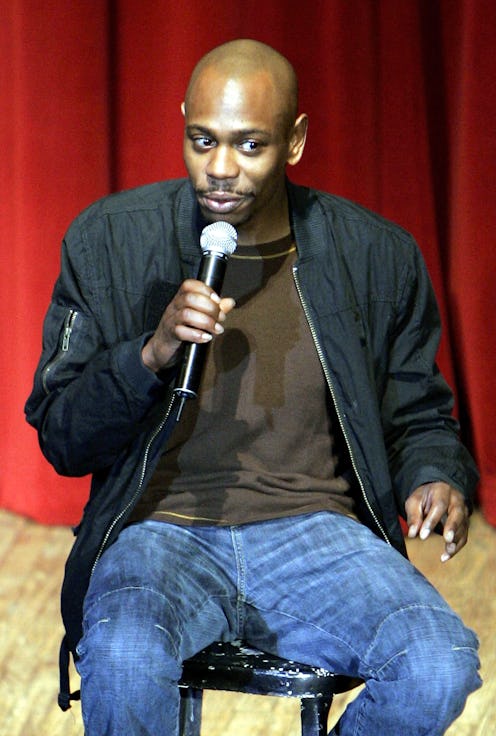Entertainment
A Simplified Guide to the Chappelle Incident
Last week, comedian Dave Chappelle was being heckled in the middle of his Hartford, CT show. He stopped performing in response, but actually stayed onstage (as his contract required), sitting on a stool, smoking, throwing a few comments out there, and reading a book he got from an audience member. The "stunt," if you can call it that, drew national attention surrounding why Chappelle did what he did and what it means to comedy, to Chappelle's career, and to, well, America. With the latest development that Hartford mayor Pedro Segarra has called for Chapelle to "quit whining," we thought we'd rundown what what it was that went down.
August 29, 2013: Dave Chappelle Stopped His Performance
As Vulture noted in its initial report, Chappelle had been trying out a new, more laid-back style of stand-up in his act. The audience in Hartford did not respond favorably. Not standing for watching a pro like Chappelle talk and let the jokes come naturally, the crowd got so rowdy and heckled so thoroughly that the festival hosting the event tweeted at them to shut up.
It was Chappelle who shut down, though, making sure to let the audience know that it was their actions that were causing the sudden stop. Sometimes he was silent, sometimes he told stories of Damon Wayans having to deal with similarly terrible crowds. When his time was up he walked off the stage to Kanye West's "New Slaves." He commented "I forgive some of you, but I don't forgive all of you."
There had been talk of erratic performances since his departure from his Comedy Central show in 2005, but this seemed like an entirely different animal.
So what happened next?
Much as Chappelle predicted, the story of his aborted performance made national news the next morning. Many called it a "melt down." Many others vehemently disagreed.
Lesli-Ann Lewis, who was in the audience that night, recounted to Ebony.com why what happened that night was bigger than one stand-up comic:
Chappelle wasn’t having a meltdown. This was a Black artist shrugging the weight of White consumption, deciding when enough was enough...There is a long history of asking African-Americans to endure racism silently; it’s characterized as grace, as strength. Chappelle’s Connecticut audience, made up of largely young White males, demanded a shuck and jive. Men who seemed to have missed the fine satire of the Chappelle show demanded he do characters who, out of the context of the show look more like more racist tropes, than mockery of America’s belief in them.
And Now?
Well, since the incident itself and the initial press surrounded it, Chappelle's continued on the Oddball Comedy & Curiosity Tour Festival. On his stop in Chicago he addressed that night, and he didn't exactly have any glowing reviews for the Hartford crowd.
I don't want anything bad to happen to the United States but if North Korea ever drops a nuclear bomb on this country, I swear to God I hope it lands in Hartford, Connecticut...I wanted to pull a reverse Kramer and call 'em all crackers or something crazy like that. I know that shit'll be on YouTube. 'Funnyman Dave Chappelle calls a room full of white people crackers.' Couldn't do that. I felt bad when Kramer did that shit to us.
Comedian Patton Oswalt (whose Twitter feed can always be counted on for opinions on topical issues) tweeted his support of Chappelle, telling his more loud-mouthed fans that "he's one of the best comedians working, [and] you're not letting him do what he loves. Stop being a**holes."
Today Hartford's mayor, holding the apparently opposite opinion of Oswalt, spoke out about the incident that took place in his city. "Dave Chappelle needs to quit whining, do his job and try some yoga," Segarra tweeted earlier today. It makes sense he's not Chappelle's biggest fan at the moment, considering the above remarks basically confirming Chappelle wouldn't care if Segarro's city were hit with a nuclear bomb.
"His recent remarks were immature and inappropriate," Segarra said in a statement to TMZ ."[He] should stick to his job, give the fans what they paid for and not disparage the good people of Hartford."Oof. Kind of reminds us of this excerpt from Lewis' above-mentioned Ebony essay:
When [Chappelle] expressed shock at the fact that he’d sat there and been yelled at for so long, people yelled that they'd paid him. They felt paying for a show meant they could verbally harass him, direct him in any tone of voice, as though they’d bought him.
What happened between Dave Chappelle and that audience in Hartford a week ago is staying in the press for a reason, and that reason goes a little further than being just about the fact that the entertainment news cycle is ready to focus on someone other than Miley Cyrus. It was a very telling moment between a comedian and his hecklers, and between a black performer and his audience.What happened that night cannot be viewed without the context that comes with it, and that goes beyond just the context of Chappelle himself and his past on-stage antics. In a world that is most definitely not post-race, what happened in Hartford was just one of a long history of messed-up dynamics, for any comedian but most especially those of color. For both the comedy world and for the wider society's, it's a night worth remembering.
